Related Research Articles

Rufus C. Thomas, Jr. was an American rhythm-and-blues, funk, soul and blues singer, songwriter, dancer, DJ and comic entertainer from Memphis, Tennessee. He recorded for several labels, including Chess Records and Sun Records in the 1950s, before becoming established in the 1960s and 1970s at Stax Records. He is best known for his novelty dance records, including "Walking the Dog" (1963), "Do the Funky Chicken" (1969), and "(Do the) Push and Pull" (1970). According to the Mississippi Blues Commission, "Rufus Thomas embodied the spirit of Memphis music perhaps more than any other artist, and from the early 1940s until his death . . . occupied many important roles in the local scene."

Carla Venita Thomas is an American singer, who is often referred to as the Queen of Memphis Soul. Thomas is best known for her 1960s recordings for Atlantic and Stax including the hits "Gee Whiz " (1960), "B-A-B-Y" (1966) and "Tramp" (1967), a duet with Otis Redding. She is the daughter of Rufus Thomas.

Joseph Lewis Thomas, known mononymously as Joe, is an American R&B singer-songwriter and record producer. Born and raised in Ashburn, Georgia, he later relocated to Atlanta and signed a record deal with Polygram Records in 1992. He rose to prominence after releasing his debut album Everything the following year. He followed it with a series of successful albums under Jive Records, including All That I Am (1997), the international bestseller My Name Is Joe (2000) as well as the multi-certified albums Better Days (2001) and And Then... (2003). Several songs from these albums became hit singles on the pop and R&B record charts, including the number-one hit "Stutter", the top ten entries "All the Things ", "Don't Wanna Be a Player", and "I Wanna Know" as well as his collaborations "Faded Pictures", "Thank God I Found You" and "Still Not a Player".

"Stoned Love" is a 1970 hit single recorded by The Supremes for the Motown label. It was the last Billboard Pop Top Ten hit for the group, peaking at number seven, and their last Billboard number-one R&B hit as well, although the trio continued to score top ten hits in the UK into 1972. In the UK, it was the post-Ross Supremes' biggest hit, reaching number 3 in the singles chart. The single spent six weeks in the UK top ten and five weeks in the US top ten. The BBC ranked "Stoned Love" at number 99 on The Top 100 Digital Motown Chart, which ranks Motown releases solely on their all time UK downloads and streams.

"Just My Imagination (Running Away with Me)" is a song by American soul group The Temptations, written by Norman Whitfield and Barrett Strong. Released on the Gordy (Motown) label, and produced by Norman Whitfield, it features on the group's 1971 album, Sky's the Limit. When released as a single, "Just My Imagination" became the third Temptations song to reach number 1 on the US Billboard Hot 100. The single held the number 1 position on the Billboard Pop Singles Chart for two weeks in 1971, from March 27 to April 10. "Just My Imagination" also held the number one spot on the Billboard R&B Singles chart for three weeks, from February 27 to March 20 of that year.

"Thieves in the Temple" is a song by American musician Prince from the 1990 soundtrack album Graffiti Bridge. Added at the last minute, it was the final song recorded for the album. "Thieves in the Temple" topped the US R&B chart and became a number six hit in the US, and a number seven hit in the UK. The single also peaked at number nine on the dance chart.

"The Way You Move" is a hip-hop and soul song performed by Big Boi of American hip hop duo OutKast. The song features OutKast mentor Sleepy Brown on guest vocals. Along with "Hey Ya!", recorded by OutKast's other member André 3000, "The Way You Move" is one of the two lead singles from Speakerboxxx/The Love Below, OutKast's double album project that includes a solo album from each member.

"I'm Every Woman" is a song by American singer Chaka Khan, released as her debut solo single from her first album, Chaka (1978). It was Khan's first hit outside her recordings with the funk band Rufus. "I'm Every Woman" was produced by Arif Mardin and written by the successful songwriting team Nickolas Ashford and Valerie Simpson. The single established Chaka's career outside the group Rufus, whom she would leave after their eighth studio album Masterjam was released in late 1979.
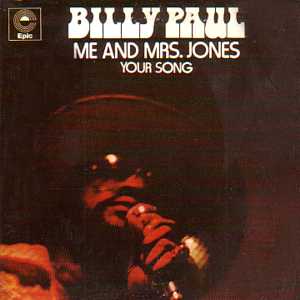
"Me and Mrs. Jones" is a 1972 soul song written by Kenny Gamble, Leon Huff, and Cary Gilbert, and originally recorded by Billy Paul. It describes an extramarital affair between a man and his lover, Mrs. Jones. In the song, the two meet in secret "every day at the same cafe", at 6:30, where they hold hands and talk. The two are caught in a quandary: "We got a thing going on/we both know that it's wrong/but it's much too strong/to let it go now."
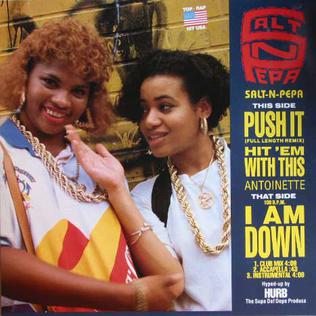
"Push It" is a song by American hip hop group Salt-N-Pepa. It was released as the B-side of the "Tramp" single in 1987. It peaked at number 19 on the US Billboard Hot 100 in early 1988 and, after initially peaking at number 41 in the UK, it re-entered the charts after the group performed the track at Nelson Mandela's 70th birthday concert, eventually peaking at number two in the UK in July 1988. The song has also been certified platinum by the Recording Industry Association of America (RIAA). The song is ranked number 446 on Rolling Stone's list of the 500 Greatest Songs of All Time and was ranked number nine on VH1's 100 Greatest Songs of Hip Hop.
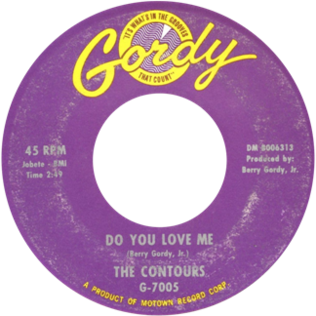
"Do You Love Me" is a rhythm and blues song recorded by the Contours in 1962. Written and produced by Motown Records owner Berry Gordy Jr., it appeared twice on the Billboard Hot 100 chart, reaching numbers three in 1962 and eleven in 1988.

"Something He Can Feel" is a song composed by Curtis Mayfield for the 1976 motion picture Sparkle. The song, a love ballad in a Chicago-/Philly-soul style, became a number-one hit on the Billboard's R&B singles chart in the United States twice with two separate recordings: a 1976 version by Aretha Franklin from the film's soundtrack, and a 1992 cover by girl group En Vogue.
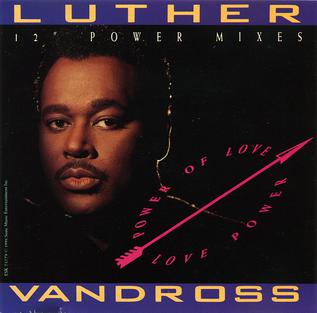
"Power of Love/Love Power" is a single by American singer-songwriter Luther Vandross. It was released on April 9, 1991 as the lead single from his 1991 album of the same name. The hit song spent two weeks at number one on the US R&B chart, and peaked at number four on the US pop chart, becoming his biggest pop solo hit.
"Superstar" is a 1969 song written by Bonnie Bramlett and Leon Russell with a songwriting credit also given to Delaney Bramlett that has been a hit for many artists in different genres and interpretations in the years since; the best-known versions are by the Carpenters in 1971, and by Luther Vandross in 1983.
"I'm Sorry" is a 1960 hit song by 15-year-old American singer Brenda Lee. The song was written by Dub Allbritten and Ronnie Self. It peaked at No. 1 on the Billboard Hot 100 singles chart in July 1960. On the UK Singles Chart, the song peaked at No.12. AllMusic guide wrote that it is the pop star's "definitive song", and one of the "finest teen pop songs of its era".

"Sara Smile" is a song written and recorded by the American musical duo Hall & Oates. It was released as the third single from their album Daryl Hall & John Oates. The song was the group's first top 40 and first top ten hit in the US, reaching number four on the Billboard Hot 100.
"Move On Up" is a song by Curtis Mayfield from his 1970 debut album, Curtis. Nearly nine minutes long on the album version, it was released as a single in the United States, but failed to chart. An edited version of the song spent 10 weeks in the top 50 of the UK Singles Chart in 1971, peaking at number 12, and it has become a soul classic over the years. In 2021, it was listed at No. 474 on Rolling Stone's "Top 500 Best Songs of All Time".
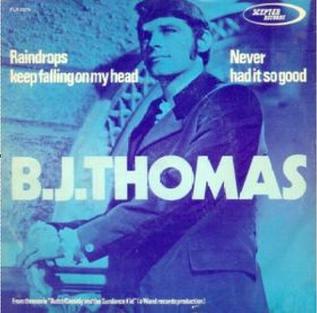
"Raindrops Keep Fallin' on My Head" is a song written by Burt Bacharach and Hal David for the 1969 film Butch Cassidy and the Sundance Kid. The uplifting lyrics describe somebody who overcomes his troubles and worries by realizing that "it won't be long till happiness steps up to greet me."

"Do We Have a Problem?" is a song by rappers Nicki Minaj and Lil Baby. It was released on February 4, 2022. The music video runs nine minutes long and is inspired by the 2010 movie Salt. In the United States, the song debuted and peaked at number two on the Billboard Hot 100, and topped the Hot R&B/Hip-Hop Songs chart. Internationally, it reached number three in South Africa, and 14 in Canada. It was included on Minaj's first greatest hits album, Queen Radio: Volume 1 (2022).
References
- ↑ "(Do The) Push and Pull", 45cat.com. Retrieved 17 July 2015
- ↑ Whitburn, Joel (2004). Top R&B/Hip-Hop Singles: 1942-2004. Record Research. p. 557.